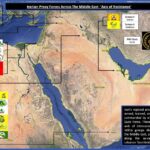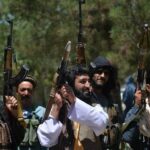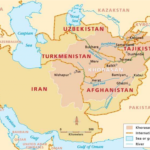This is the second volume of the Running to Disaster series, the first volume can be read here.
To fully understand the Afghanistan chessboard, it is important to understand all the overt and covert players. Operation: Dinner Out, the second volume of Running to Disaster, an extensive examination and explanation of the conflict.
An old quote circulates in intelligence community circles when they discuss the Muslim world, granted its originally quoted source unknown, about the Middle East:
“A voluntary resignation is slightly more elegant than a bullet to the brain. But without the threat of one, we can never achieve the other.”
Creating conflict, whether real or imagined, is the job of the intelligence community.
We cite the intelligence community because their role was, and continues to be, significant in the creation of the model, use of resources to mature and mutate conflicts, and convert them into terrorism and/or insurgencies.
The Soviet Union’s invasion of Afghanistan in 1979 brought nearly every major intelligence agency into the region. Besides the fact of direct confrontation between the CIA and the KGB, which was started well before the invasion, every other intelligence agency was using the battlefield to capture their own advantage.
The former KGB officer, Yuri Bezmenov, who commented on the activities of the KGB, was quoted once:
“Only about 15% of time, money, and manpower is spent on intelligence as such. The other 85% is either ideological subversion or active measures.”
Another former KGB official, author of Spymaster: My Thirty-two Years in Intelligence and Espionage Against the West, and former head of political operations in the US, General Oleg Kalugin, said
“Not intelligence collection, but subversion: active measures to weaken the West, to drive wedges in the Western community of alliances… to sow discord among allies…”
The CIA’s role during the invasion of Afghanistan was neither covert, nor were attempts made to deny their role. The KGB, however, has been excluded from most conversations related to terrorism, as they are blamed for the invasion itself.
It should also be clear that without the involvement of the CIA in Afghanistan, Pakistan’s own Inter-Service Intelligence (ISI) would not have matured exponentially in intelligence, espionage, and covert measures.
The role of intelligence agencies is both key to the foundation and eventually regional and global expansion.
Some will wonder the rationale behind decades-old historical information, which many think they already know.
The point of a historical review is to simplify understanding of the actions, incentives, and opportunities to damage Pakistan, not only since, but also because of, supporting the United States against the Soviet Union in Afghanistan. And, as if the scars from the first battle weren’t memorable enough, Pakistan repeated the mistake again post-9/11 as another ill-conceived, mismanaged decision was again taken by the military leadership of Pakistan.
This historical review is also important, as it filters rumor mills that speak based on the snippets of information gleaned from friends, drawing rooms, media channels, social media, and politicians.
There is enough blame for everyone, but maybe some would like to avoid highlighting their role in a disaster that has taken the world by storm.
This report is a compilation and analysis of documents that have been either received, collected, or published by government departments, intelligence agencies, research reports and studies from multiple countries that were involved in the conflict. This analysis has purposely excluded India due to their pro-Communist position the Prime Minister Indira Gandhi, her Congress Party, and her government. We have included broad strokes of the KGB’s involvement with India, but not gone into detail.
For the purpose of the first two volumes of the Running to Disaster series, CommandEleven has focused its research and analysis on:
- guerrilla warfare and terrorist organizations created by the United States and CIA
- active measures taken by the Soviet Union and KGB used against Pakistan and its people
- machinations of imperialism and regional dominance from the Pakistan and the ISI
- ideations of a global Khalifat by high-net-worth Middle Easterners, radicalized fighters, and mullahs
- motivations of independence induced by those who have nothing to lose and a great deal to gain from instability

Running to Disaster – Part II – Op Dinner Out
Syed Khalid Muhammad, the Founder and Executive Director of CommandEleven, brings over three decades of leadership experience, guiding organizations globally in the realms of security, technology, marketing, and management. Notably, he authored "Agency Rules: Never an Easy Day at the Office," a pioneering espionage novel published in 2013. This novel holds historical significance as the first English-language espionage novel written by a Pakistani, achieving international bestseller status and currently available on Amazon.
Furthermore, Syed Khalid Muhammad has made notable appearances on several international TV channels, providing insightful analysis on security and geopolitics.
Since the establishment of CommandEleven in 2015, Khalid has expanded his expertise to encompass analysis, risk and threat assessment, and consultancy in the fields of terrorism, counter-terrorism, counterintelligence, geopolitics, and cognitive warfare. Within CommandEleven, he has successfully cultivated a comprehensive human and electronic intelligence network spanning the Indian subcontinent. Continuously growing, this network extends into various conflict zones globally, providing CommandEleven with actionable, real-time intelligence that forms the foundation of its analytical endeavors.
CommandEleven currently serves multiple clients, including corporate giants, by assisting them in analysis related to security, threat assessment, and threat mitigation strategies in Pakistan and Afghanistan.









